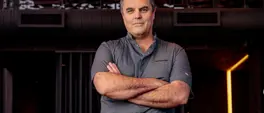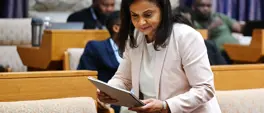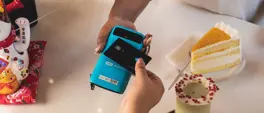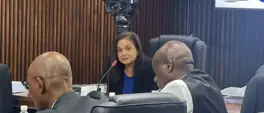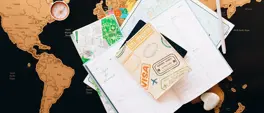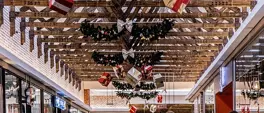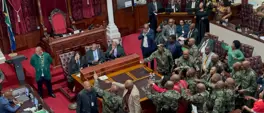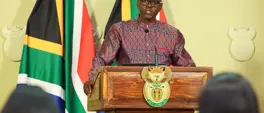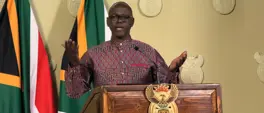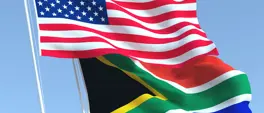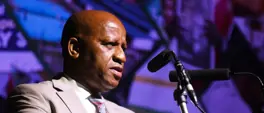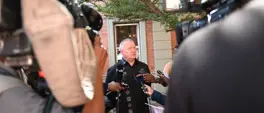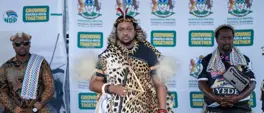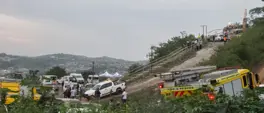MANDY WIENER: Celebrate South Africa's beautiful demonstration of democracy
Mandy Wiener
15 June 2024 | 8:00We witnessed democracy at work and it was beautiful. South Africa showed many first world countries how it is done.
CAPE TOWN - It took fourteen hours, but finally at 00:00 Matamela Cyril Ramaphosa stepped off the podium in the CTICC having completed his acceptance speech as the President-elect of the Republic of South Africa.
It was a remarkable day in the realignment of South African politics.
Thirty years into democracy, we the people of the country bore witness to the practical demonstration of our incredible Constitution.
We witnessed democracy at work and it was beautiful. South Africa showed many first world countries how it is done.
More than half of the globe goes to the polls this year and ours was an example of what is possible.
The two weeks leading up to the first sitting of the National Assembly on Friday were defined by uncertainty and flux. The ANC, the liberation movement that had been in power for thirty years since 1994, had for the first time not won an outright majority.
This meant it had to weigh up its options. Ultimately it chose the safe, unifying option and invited all parties to join a Government of National Unity.
For two weeks, behind closed doors, negotiations took place and South Africans held their anxiety. The markets and the currency wavered.
There was last minute scrambling. It was only two hours after the Parliamentary sitting began that pen was finally put to paper and the deal between the ANC and the second largest party, the DA, was formally signed. Ultimately, the centre held.
We may not realise now how close we came to the brink of instability and chaos. But on the face of it, what we saw play out at national level was a Parliament carrying out its business with dignity and decorum as office bearers were elected.
Candidates were nominated and where issues arose, they were reasonably ventilated and contested.
In the National Assembly, the EFF raised its concerns about the voting process not being transparent. Chief Justice Raymond Zondo acceded to a request that the counting of votes for the Speaker be observed by political parties. This was then subsequently allowed for the vote on the Deputy Speaker and the President. It was a dispute that was resolved speedily and with clarity.
In provinces across the country, that process was replicated. Premiers and Speakers were elected.
In KwaZulu-Natal, a dispute arose around the secrecy of the ballots. The MK party raised a concern that the ballots were not in fact being done in secret. It became tense. Cameras were switched off. We worried that the situation would boil over. But it was resolved and the decision was accepted.
We saw political parties from across the spectrum working together in the interests of getting the government working. In the opposition, the so-called 'Progressive Caucus' organised itself into nominating and seconding candidates.
The judiciary presided with gravitas and respect, from Chief Justice Zondo to the respective Judge Presidents in the provinces.
Law enforcement kept close watch and rule of law was maintained. There was a real concern leading up to the first sittings, that the boycotting of the National Assembly by former President Jacob Zuma’s MK party could spark tensions. MK being excluded from the GNU and its failure to convert a 45% majority in KZN into a coalition government, escalated concerns about how MK supporters would respond.
Extra police officers were deployed to the province. The ominous threat of violence has not materialised.
Let’s hope that holds. Zuma is expected to "address the nation" on Sunday.
There has been none of the anarchy and lawlessness that we witnessed in July 2021. Instead there has been a dignified and democratic transition from the sixth administration to the seventh.
It is remarkable that the governing party, in power for over three decades, so maturely and willingly transitioned to a Government of National Unity - which in reality is a coalition.
The ANC has labelled this as a demonstration of the maturing of our democracy.
We saw the outcome of the elections being accepted by opposition parties even though they didn't like it or necessarily agree with it.
Our elected leaders sang and danced energetically, trolled each other with witty jokes, called each other corrupt and incompetent and it was just another day in our politics. Only in Mzansi.
With the MK party being absent from Parliament, EFF leader Julius Malema assumed the mantle of opposition leader. He had made it clear on the eve of the sitting that the party would not be employing its disruptive and obstructive tactics any longer. The days of storming the stage at SONA and fighting with bouncers were over.
Malema and Ramaphosa contested the vote for President and once Ramaphosa had been re-elected, opposition parties had a chance to address the house.
"Congratulations Mr President. We accept the results and the voice of the people of South Africa and we also accept the results of this today's gathering because it’s a reflection of a democratic practices. But we contested because we wanted to demonstrate to South Africa that we don’t agree with this marriage of convenience to consolidate white monopoly power over the economy and means of production in South Africa," Malema said.
"We are going to ensure that this Parliament is functional. We can reassure you that we won’t fight with any bouncer. We are going to be the best and effective opposition that is going to ensure that both you and the DA are held accountable."
New parliamentarian and former journalist Songezo Zibi eloquently reminded us in his speech that we can never take the peaceful transfer of power from one administration to another for granted.
"Today is a day on which we get to see the miracle of democracy. The peaceful transfer of power from one administration to the next. It is something we must never ever take for granted. Because other countries and other societies are not so fortunate to have what we have in South Africa," said the Rise Mzansi leader.
As the clock ticked towards midnight, Ramaphosa, the president-elect acknowledged the democratic process and reminded us what we as a nation have achieved.
"I wish to state very clearly this is not a grand coalition of two or three parties. It is a government of national unity that we are constituting, and we’ve been here before. We were here in 1994 when we sought to unite our country and effect reconciliation. We are here now, as directed by the votes that our people delivered, to work together to ensure that we address the challenges that they face. And this we shall do, and this is what I am committed to achieving as the president of the Republic of South Africa."
As a colleague reminded me after the long day drew to an end, "The true value of democracy is not the ability to put the right people in power. It’s the ability to regularly and peacefully remove the wrong ones from it."
Ramaphosa will be inaugurated on Wednesday at the Union Buildings.
The road ahead will be turbulent and rocky. We don’t know if the GNU will achieve its much lauded expectations. The future is fraught with potential failure.
But for now, let’s celebrate what we have achieved South Africa. Democracy is beautiful.
Get the whole picture 💡
Take a look at the topic timeline for all related articles.
Trending News
More in Opinion

12 December 2025 15:34
CHARLES MATSEKE | The Republic of commissions arrives at its point of no return
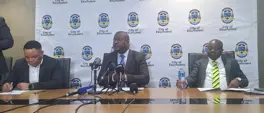
12 December 2025 14:15
REBONE TAU | Ekurhuleni needs bold, decisive leaders to reverse years of capture

12 December 2025 05:13
MANDY WIENER | Searching for a superhero with a spine of steel: Why the position of NDPP matters so much
